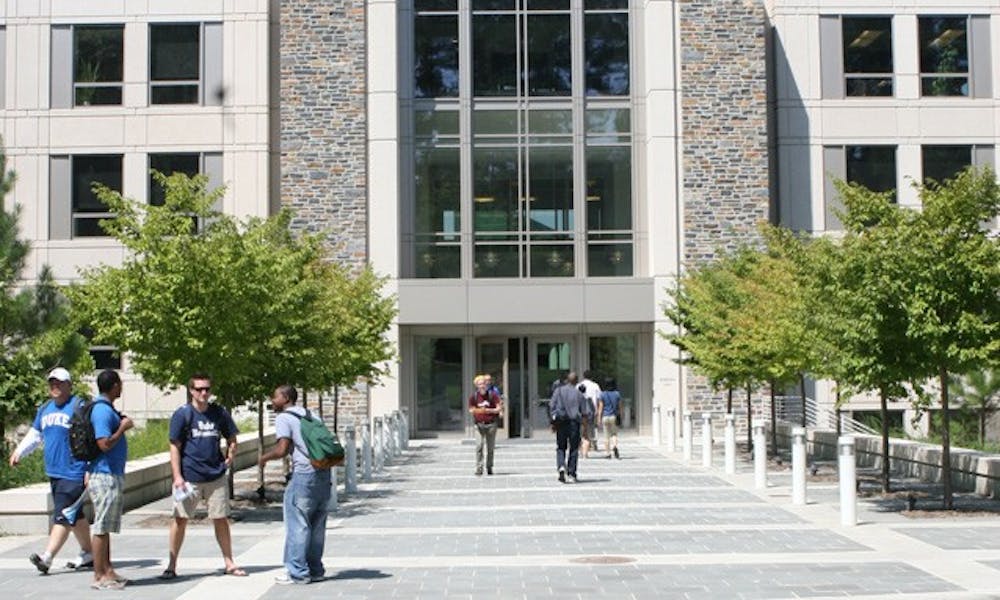At a time when many business schools are seeing slow, if any, growth, the Fuqua School of Business’ global approach has allowed it to attract a record number of applicants.
Many of Fuqua’s programs enjoyed large increases in the number of applicants last year, including its Daytime MBA program, which saw a 21 percent increase, said Liz Riley Hargrove, associate dean for admissions at Fuqua. The rise can be partially attributed to Duke’s global strategy and recruitment efforts across the world, Hargrove added.
Fewer business schools across the world are reporting such increases, however, according to an Aug. 25 Graduate Management Admission Council study. Only 44 percent of the 476 programs offering MBAs reported gains in the number of applications, as opposed to 66 percent in 2009 and 70 percent the year before.
“We really wanted to capitalize on what it meant for Duke to be really the world’s first legitimate business school,” Hargrove said, adding that Fuqua employs staff in five regions of the world to help with recruitment. “Having a physical presence gave us more manpower and it also enabled us to relate that strategy to prospective students because we were able to see more people in person and connect them with our alumni.”
It was a record year for the Daytime MBA program, which received a total of 3,551 applications—the most it has ever received, she noted. Specific GMAC data was not released, but Sam Silverstein, GMAC manager of media and public affairs, confirmed that Fuqua was one of the programs surveyed.
Silverstein added that 13 percent of all full-time MBA programs surveyed saw a “significant increase” of 21 percent or more applicants.
In addition to having business school staff throughout the world, Hargrove said Fuqua gave students attending information sessions an application discount. Students who attended an information session or who visited Fuqua paid $50 as opposed to the regular $200 fee, she said.
“We definitely increased the volume of applications and we also increased the quality,” Hargrove said, adding that the average Graduate Management Admission Test score among applicants increased from 688 to 697 and that program selectivity increased as the acceptance rate fell from 30 percent to 24 percent.
For first-year Daytime MBA student Brad Sawchuk, the application discount encouraged him to consider Fuqua.
“I was not seriously looking into Fuqua, but when I found out about the discount it motivated me to come here... and then it was my first choice,” Sawchuk said.
Fuqua executive MBA programs also experienced an increase in applications. The Cross-Continent, Global Executive and Weekend Executive MBA programs saw 42, 11 and 12 percent increases in applications, respectively, according to Fuqua’s media relations office. The enrollment of all three programs also grew.
But the situation was different at many other top business schools. Bloomberg Businessweek reported that of the top 30 full-time MBA programs surveyed, 10 reported application declines. Nine universities declined to supply application data.
The University of Pennsylvania’s Wharton School, recognized as one of the best in the country, reported to Businessweek a 9 percent decrease in applications.
According to the GMAC survey, the downward trend was to be expected because of the “cyclical nature of application volume trends.” The pattern is partially due to the economy, Silverstein said.
“When people make the calculations and say, ‘OK, I’m going to give up my job and go to school,’ the calculation might be that when people start to see the economy get worse, the [motivation] to take a breather from working and go to business school is higher,” Silverstein added, explaining that job availability is a major indicator of the economy.
Pinar Aycan, a second-year Daytime MBA student, said Fuqua’s strong relationships with business industries are part of the reason why the school was able to recruit successfully last year.
“There is a disconnect with some schools and their industries,” Aycan said. “There is a reason as to why people chose to come here as opposed to somewhere else.”
Get The Chronicle straight to your inbox
Signup for our weekly newsletter. Cancel at any time.

